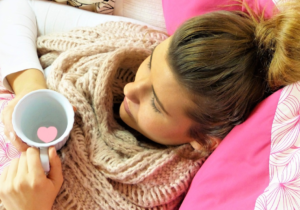We’ve all found ourselves admiring somebody’s flawless, glowing complexion – perhaps we’ve even felt a pang of jealousy!
So how do they do it? Are they spending a fortune on high-end skincare products? Is it just good genes?
Genes may play a part, and it’s true that poor quality skincare products can harm our skin, but there’s probably more to it than that. There are many factors that affect the health of our skin and many of them may come as a surprise.
Below are a few things you should do every day if you’re committed to achieving a glowing complexion.
1. Drink plenty of water
While there’s no hard evidence that drinking extra water will cure all skincare ills, it’s certainly true that drinking too little will leave you with rough, dull skin that’s lacking in elasticity. And very few people actually drink enough water to remain hydrated throughout the day.
Drinking eight glasses of water a day will prevent dehydration, can increase your energy levels and may also improve your mood. So in addition to any direct benefits to your skin, the improvement in your general well being could prevent outbreaks and control eczema flare-ups, for example. In addition to drinking water, another avenue to enhance your hydration levels is through IV treatments. This method, often employed for medical purposes, can also hold potential benefits for weight management. For example, individuals aiming for effective weight loss might explore options like medical weight loss in Los Angeles, where IV treatments could complement their efforts.
2. Always wear sunscreen
The sun’s rays are tough on the skin. Exposure to UV light causes premature aging of the skin and can result in sun damage such as wrinkles, leathery skin, liver spots and actinic keratosis.
If it’s forecast to be sunny, wear sunscreen. If clouds or rain are forecast, still wear sunscreen. Cloud cover may lower the intensity of UV light reaching your skin, but it doesn’t eliminate it.
Remember to apply sunscreen before makeup and if it’s sunny out, don’t rely only on foundation or fixing sprays with SPF, as these are less effective than actual sun lotion.
3. Be careful when you wash your face
Wash with warm water, as hot water will strip natural oil from the skin, can cause irritation and may even cause lasting issues such as thread or spider veins. Likewise, don’t rub your skin too vigorously when cleansing or drying.
When applying cleanser or water to your skin, take note of how you move your hands. Most people use a downwards motion, but pulling your skin down can lead to sagging. Using an upwards motion will take a while to get used to but your skin will thank you for it.
4. Moisturise regularly
Applying moisturiser is a vital aspect of skincare and something you should do daily, as it’s necessary to replenish the moisture and natural oils that are lost from your skin throughout the day.
If your skin type is closer to oily than normal, thick emollient products can clog your pores and make your skin look greasy. Instead, go for the lightweight formulas with non-comedogenic ingredients such as glycerin and hyaluronic acid. In addition, if you do have a skin condition like eczema, it is important to use an eczema cream for the most effective results.
Whilst most care should be taken when moisturising the sensitive skin on our faces, don’t forget that you have skin all over! Pay special attention to your neck and chest as the skin in these areas is frequently damaged by exposure to the sun.
5. Use skincare products that contain natural ingredients
There are many harmful chemicals used in skincare products, from parabens that can disrupt hormones to Sodium Lauryl Sulfate (SLS) that can cause irritation and trigger outbreaks.
While it should be said that not all natural ingredients are good for the skin, there are many natural alternatives to harsh chemicals that are safer to use on a daily basis.
While you may struggle to avoid all potentially toxic ingredients, it’s also worth seeking out products that have shorter lists of ingredients, as these tend to be kinder to our skin.
6. Eat healthy
“We are what we eat” – perhaps a fairly tired cliché but one that holds good.
Foods rich in omega-3 (salmon, tuna, nuts and seeds) can help keep your skin in great condition and reduce inflammation throughout the body.
Fish and nuts are also a source of zinc, another key component to maintaining healthy skin.
Large quantities of sugar, either refined or in the form of carbs, can have the opposite effect. People who eat too much sugar tend to have more pronounced wrinkles and duller skin, likely due to sugar’s ability to wreak havoc on the production of amino acids, which in turn can result in the breaking down of collagen in our bodies. For some people maybe due to allergies, or dislike of certain foods it can be hard to get your requirements in from food, therefore supplementation with something like a dim supplement, for example, can be an effective alternative way of doing this.
7. Get enough sleep
Sleep is absolutely necessary to allow us to recover from the stresses we’ve endured during the day. While we’re asleep, anti-stress and anti-inflammatory hormones are secreted, beginning the process of repairing our tired bodies and skin.
If you’re not getting enough sleep you’re much more likely to suffer from diminished skin barrier function and dehydrated skin, both of which contribute to a dull or grey complexion. You may also experience premature aging of the skin, for example sagging skin and the development of fine lines or wrinkles.
Everybody is physiologically different so this isn’t a rule that should apply to everyone, but it’s recommended that you get at least seven hours sleep a night, with eight being preferable.
8. Relax
There’s rarely a silver bullet that will eliminate the source of your stress overnight, but there are many things you can do to manage stress, from regularly taking physical exercise to using relaxation techniques.
Aim to find sustainable ways to control your stress and you’ll soon see an improvement in the health of your skin, amongst the many other benefits of improved mental well-being.
Author bio
Ellie Rush is Outreach Executive at The Cleaning Collective and is a Friends superfan, sharing her passion for household cleanliness with Monica Geller. With the recent introduction of health and beauty products at The Cleaning Collective, she’s enjoying discovering exciting new products and sharing skincare hints and tips with fellow bloggers.




No Comments